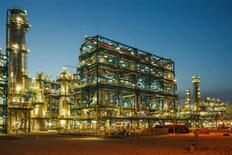- The €1.3 billion polyol complex in Tiszaújváros has a capacity of 200,000 tonnes per year.
- The project involved engineering work from Germany, Thailand, India, and Hungary, with equipment from 24 countries.
- Construction used 75,000 cubic meters of concrete, 13,000 tonnes of steel, 2,500 km of cable, and 700 km of pipelines.
- The Hungarian government contributed €131.5 million, including a €93.6 million tax credit and a €37.9 million investment grant.

Project Overview
The €1.3 billion polyol complex in Tiszaújváros, Hungary, is MOL's largest organic investment to date. The complex, supported by the Hungarian state, will produce raw materials for durable plastic consumer goods such as bed mattresses, car seats, house insulation, and sports shoe soles. The plant, utilizing advanced technology from thyssenkrupp Uhde and Evonik, has a capacity of around 200,000 tonnes of polyol per year.
Construction and Technology
The project involved an international team of experts, with engineering design work carried out in Germany, Thailand, India, and Hungary. Equipment for the plant came from 24 countries. The construction process included 75,000 cubic meters of concrete, 13,000 tonnes of steel, 2,500 kilometers of cable, and 700 kilometers of pipelines, completed over 18 million working hours. The main units were transported to Tiszaújváros between 2019 and 2020, primarily by water.
Government Support
The Hungarian government contributed €131.5 million to the project, including a €93.6 million corporate tax credit and a €37.9 million investment grant. This support underscores the project's significance for Hungary's industrial competitiveness and economic growth.
Production and Impact
The polyol produced at the Tiszaújváros plant is a key raw material for polyurethane, used in various industries from car manufacturing to construction. The plant will contribute nearly €150 million annually to MOL Group's financial results and provide long-term employment for nearly 300 people. This investment is part of MOL Group's broader strategy to strengthen its chemical business and prepare for the energy transition.

